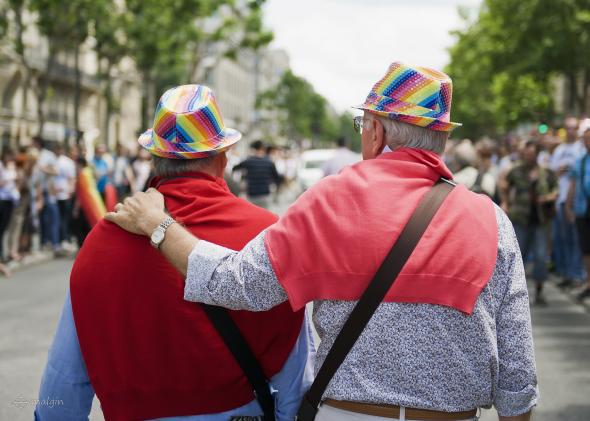By 2030, America will be home to some 3 million LGBTQ seniors; however, a physical home, rather than a national one, is what many of them will be seeking. That’s according to aWashington Post story today covering the opening of an “LGBT-friendly” housing complex in the “gayborhood” area of Philadelphia. The John C. Anderson Apartments join only two other such projects in the country—one in Minneapolis and one in Los Angeles—which offer about 200 affordable units all told. If the speed with which the Philly apartments have filled up is any indication, we’re going to need a lot more in the coming years.
Housing and caring for queer elders is, on one hand, a moral issue. As the piece points out, an often youth-focused gay culture can often be hostile to older people, despite the fact that their struggles made its existence possible in the first place.
Those seniors belong to the generation that blazed a trail for gay rights, said Mark Segal, chairman of the Dr. Magnus Hirschfeld Fund, which spearheaded the development. Yet their activism and openness often cost them both family ties and the opportunity for traditional jobs with retirement benefits, he said.
“Why should people, who were the pioneers of the community, not live with dignity? It’s outrageous,” Segal said. “We have to take care of our own — nobody else is.”
But eldercare is also a matter of economic justice. The responsibility that Segal articulates is easy to forget in the era of gay marriage, in which same-sex couples are increasingly able to consolidate their wealth and plan for their retirements and estates in ways that older generations just couldn’t. And regardless of whether gay elders found life partners or not, the hard truth is that, as Segal mentions, simply being queer and out in previous decades often had severe—and long-term—consequences on an individual’s finances.
But the most unconscionable aspect of this issue—and the one that affordable elder housing is ideally suited to prevent—is the pressure many LGBTQ seniors feel to go back into the closet after a lifetime of openness. This kind of retreat can seem necessary in traditional nursing homes and retirement communities as queer residents are forced to reintegrate with their less tolerant age-group. Imagine the pain of having to police your behavior or refrain from discussing a partner who has passed in your own home—it’s barbaric. Hopefully, other cities will take a cue from Philadelphia and work to create accommodations for our elders that afford them the peace and dignity they deserve.
